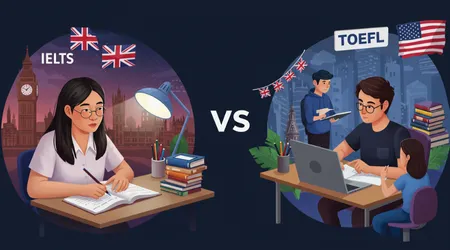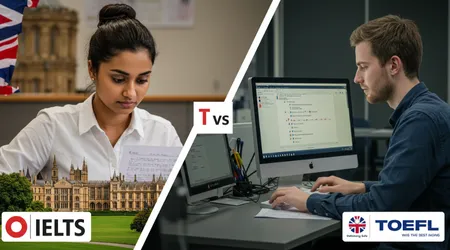IELTS vs TOEFL: Which English Test Is Best for Studying in the UK?

Choosing between IELTS vs TOEFL can feel like navigating a maze for international students aiming to study in the UK.
Both tests assess English proficiency, but their formats, scoring, and acceptance vary, impacting your university application.
With UK universities like Oxford and Cambridge requiring specific scores, understanding these differences is crucial.
This article dives deep into IELTS vs TOEFL, exploring their structures, costs, and suitability for UK study, helping you make an informed decision. Why settle for guesswork when you can align your choice with your academic goals?
Understanding IELTS and TOEFL: The Basics
The IELTS vs TOEFL debate starts with their core purpose: proving English fluency for non-native speakers. IELTS (International English Language Testing System), developed by the British Council, IDP, and Cambridge, is widely accepted in the UK.
TOEFL (Test of English as a Foreign Language), created by ETS, is more US-centric but recognized by many UK institutions. Both evaluate reading, writing, listening, and speaking, yet their approaches differ significantly.
IELTS offers Academic and General Training versions, with the former tailored for higher education. TOEFL focuses solely on academic English, emphasizing university settings.
++ How to Choose the Right University Course Based on Your Skills and Interests
For UK study, IELTS vs TOEFL acceptance leans toward IELTS, as it’s designed with British English in mind. However, TOEFL’s global reach makes it a strong contender.
The choice hinges on your target university’s preferences and your comfort with test formats. For instance, Oxford requires an IELTS score of 7.0 or TOEFL iBT of 100. Knowing these baselines shapes your preparation strategy.

Test Structure and Format: A Detailed Comparison
When comparing IELTS vs TOEFL, their structures reveal distinct philosophies. IELTS Academic includes four sections: Listening (30 minutes, 40 questions), Reading (60 minutes, 40 questions), Writing (60 minutes, two tasks), and Speaking (11-14 minutes, face-to-face).
TOEFL iBT comprises Reading (54-72 minutes, 30-40 questions), Listening (41-57 minutes, 28-39 questions), Speaking (17 minutes, six tasks), and Writing (50 minutes, two tasks).
IELTS’s face-to-face Speaking test feels conversational, ideal for those who thrive in personal interactions. TOEFL’s Speaking section, recorded via computer, suits tech-savvy test-takers.
Also read: Top Online Courses Funded by the UK Government 2025
The IELTS vs TOEFL Writing tasks also differ: IELTS requires a short essay and a data description, while TOEFL demands an integrated task combining reading and listening.
Consider Maria, a Brazilian student aiming for UCL. She chose IELTS for its human interaction, acing the Speaking section.
Conversely, Ahmed, targeting Manchester, preferred TOEFL’s structured format, excelling in its integrated tasks. Your preference for interaction or structure can guide your choice.
Scoring Systems: How They Stack Up
Scoring in IELTS vs TOEFL confuses many. IELTS uses a 0-9 band scale, with each section scored individually and averaged.
TOEFL iBT scores range from 0-120, with each section contributing 0-30 points. UK universities often require IELTS 6.5-7.5 or TOEFL 80-110, depending on the program.
A 2023 British Council report noted that 80% of UK universities prefer IELTS due to its band system’s clarity for admissions.
Read more: UK Student Finance Explained: Loans, Grants, and Repayments
Converting scores between IELTS vs TOEFL isn’t exact, but an IELTS 7.0 roughly aligns with TOEFL 94-109. This variance can affect borderline applicants.
For example, a Master’s program at LSE might accept IELTS 7.0 but require TOEFL 100. Understanding these thresholds ensures you aim for the right score. Always check your university’s specific requirements to avoid surprises.
| Test | Score Range | UK University Requirement (Example) | Section Breakdown |
|---|---|---|---|
| IELTS | 0-9 bands | 6.5-7.5 (e.g., UCL, Oxford) | Listening, Reading, Writing, Speaking |
| TOEFL iBT | 0-120 points | 80-110 (e.g., Manchester, LSE) | Reading, Listening, Speaking, Writing |
Cost and Accessibility: Practical Considerations
The IELTS vs TOEFL decision also involves logistics. IELTS costs £175-£220 in the UK, varying by location, while TOEFL iBT averages £180-£200.
Both are offered worldwide, but IELTS has more test centers (over 1,600 vs. TOEFL’s 4,500). UK students benefit from IELTS’s widespread availability.
IELTS offers paper and computer-based options, providing flexibility. TOEFL is primarily computer-based, which may challenge those less comfortable with digital interfaces. Scheduling matters too—IELTS runs up to four times monthly, TOEFL slightly less frequently.
Imagine Priya, an Indian student in London. She chose IELTS for its nearby test center and paper option, easing her test-day nerves. Accessibility and cost can tip the scales in the IELTS vs TOEFL debate, so research local options.
Test dates also matter. IELTS’s frequent sessions suit tight deadlines, while TOEFL’s scheduling may require planning. Check test center availability early to align with application deadlines.
Preparation and Resources: Setting Yourself Up for Success
Preparing for IELTS vs TOEFL demands tailored strategies. IELTS’s conversational Speaking test rewards fluency and coherence, so practice with native speakers helps.
TOEFL’s integrated tasks require synthesizing information, so focus on note-taking during listening sections. Both tests demand strong vocabulary and time management.
Free resources abound. The British Council offers IELTS practice tests, while ETS provides TOEFL sample questions.
Apps like Duolingo or Magoosh supplement preparation. Joining study groups can mimic IELTS’s Speaking environment or TOEFL’s academic focus.
Take Elena, a Spanish student. She used IELTS’s free online mocks to master time management, scoring 7.5. Conversely, Chen, a Chinese applicant, leveraged TOEFL’s practice software for its computer-based format, hitting 105. Choose resources that match your test’s demands.
Investing in prep courses can boost scores. Many UK language schools offer IELTS-focused classes, while online platforms like Kaplan cater to TOEFL. Your learning style self-study or guided shapes this choice.
Acceptance in UK Universities: What Admissions Teams Say
In the IELTS vs TOEFL debate, UK universities lean toward IELTS. Over 95% of UK institutions accept IELTS, with TOEFL accepted by about 80%, per a 2024 UCAS report.
Top universities like Cambridge and Imperial often list IELTS as their primary requirement, though TOEFL is rarely rejected outright.
Admissions teams value IELTS for its alignment with British English and academic contexts. TOEFL’s American focus can feel less relevant, but its global recognition ensures acceptance. Always verify with your target university some departments specify one test.
For instance, a Law program at King’s College might prefer IELTS 7.0 for its nuanced Writing tasks. Meanwhile, a Science course at Edinburgh accepts TOEFL 92, valuing its integrated skills. Contacting admissions offices clarifies expectations.
Cultural alignment matters too. IELTS’s British English (e.g., “colour” vs. “color”) resonates with UK academia, easing application reviews. TOEFL’s broader academic focus still works but may require extra score conversions.
Which Test Suits Your Profile and Goals?

Choosing between IELTS vs TOEFL is like picking a travel route both lead to the UK, but the journey differs. If you excel in face-to-face communication, IELTS’s Speaking test shines.
If you prefer structured, computer-based tasks, TOEFL aligns better. Your academic goals also matter IELTS suits UK-specific programs, while TOEFL fits broader international aspirations.
Consider your strengths. Are you comfortable summarizing lectures (TOEFL) or describing graphs (IELTS)? Test familiarity with British or American English also plays a role. Practice both to gauge comfort.
Time constraints are key. IELTS’s frequent test dates help rushed applicants, while TOEFL’s digital format suits tech-savvy students. Align your choice with your university’s requirements and your preparation timeline.
Reflect on long-term goals. If you plan to study in multiple countries, TOEFL’s global acceptance is a plus. For UK-focused paths, IELTS’s regional alignment gives an edge. What’s your destination, and which path feels right?
Making the Final Decision: Practical Tips
Deciding on IELTS vs TOEFL requires strategy. Start by listing your target universities and their requirements most publish score thresholds online. Next, take diagnostic tests for both to assess your strengths. ETS and British Council offer free samples to simulate test day.
Budget matters too. If costs are tight, compare local test fees and factor in prep materials. Accessibility is another angle check nearby test centers and dates. IELTS’s flexibility often wins here.
Talk to peers or advisors. A student who aced IELTS at Bristol might share tips, while a TOEFL taker at Warwick could highlight pitfalls. Their experiences ground your decision in reality.
Finally, trust your instincts. If IELTS’s human touch feels right, go for it. If TOEFL’s structure energizes you, commit. Confidence in your choice boosts preparation and performance.
Frequently Asked Questions
Q: Can I submit both IELTS and TOEFL scores to UK universities?
A: Most universities accept either, but submitting both is rarely necessary. Check specific requirements to avoid extra costs.
Q: How long are IELTS and TOEFL scores valid?
A: Both are valid for two years. Ensure your test date aligns with your application timeline.
Q: Is IELTS easier than TOEFL for non-native speakers?
A: It depends. IELTS’s Speaking test suits conversational learners, while TOEFL’s digital format favors tech-comfortable students.
Q: Do UK universities prefer British English in tests?
A: Yes, IELTS’s British English aligns better, but TOEFL’s American English is fully accepted with proper scores.
